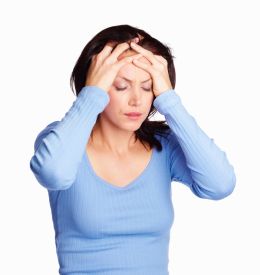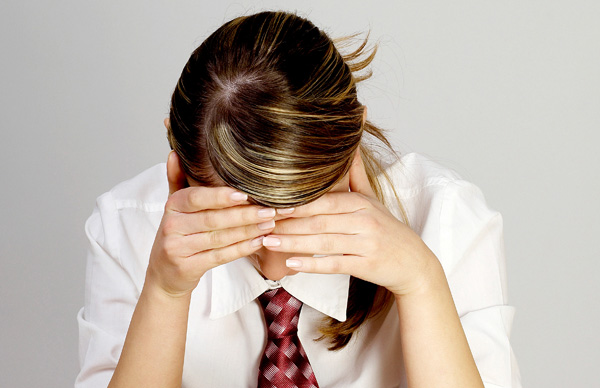PCOS and Anxiety: Is There a Link Between Them?
 Millions of people face anxiety issues every day, and the causes of these issues vary from one individual to another. Researchers, doctors, and women who suffer from Polycystic Ovarian Syndrome (PCOS) all wonder whether or not this particular condition can cause elevated levels of anxiety. PCOS is a condition that health-care professionals know relatively little about. Polycystic Ovarian Syndrome (PCOS) has a number of symptoms. Furthermore, these symptoms can occur in varying combinations, making the experience of PCOS quite personal to each and every woman who suffers from it.
Millions of people face anxiety issues every day, and the causes of these issues vary from one individual to another. Researchers, doctors, and women who suffer from Polycystic Ovarian Syndrome (PCOS) all wonder whether or not this particular condition can cause elevated levels of anxiety. PCOS is a condition that health-care professionals know relatively little about. Polycystic Ovarian Syndrome (PCOS) has a number of symptoms. Furthermore, these symptoms can occur in varying combinations, making the experience of PCOS quite personal to each and every woman who suffers from it.
That being said, pinpointing the root cause of such symptoms can be difficult. When it comes to the issue of anxiety, the difficulty is even more pronounced because anxiety has the potential to be a symptom of the condition or your body’s natural reaction to other symptoms. Read on to learn more about PCOS Anxiety.
PCOS (Polycystic Ovarian Syndrome),or PCOD (Polycystic Ovarian Disorder), is linked to anxiety in several possible ways—one, that PCOS causes chemical changes in your body that result in anxiety or, two, that the symptoms of PCOS cause anxiety. These symptoms include infertility, irregular menstrual cycles, abnormal hair growth, weight gain, acne and other skin conditions, sleep disturbances, and more. All of these can affect your life, physically and emotionally, and make anxiety all that more likely. While more research is necessary, women suffering from PCOS and PCOS Anxiety are encouraged to improve their lifestyle with exercise and diet, as both have been found to lessen symptoms of PCOS.
+ Click here to learn about the all natural PCOS 5-Element Solution
+ Click here to read more articles about PCOS and Emotional Conditions
Symptoms
PCOS Symptoms: The Lack of a Master List
 Have you been experiencing PCOS Anxiety or PCOS Depression? Both can wreak havoc on a woman’s physical and emotional wellbeing. However, knowing the symptoms of PCOS and anxiety—as well as ways to lessen their effect—can help you and your PCOS Mood immensely.
Have you been experiencing PCOS Anxiety or PCOS Depression? Both can wreak havoc on a woman’s physical and emotional wellbeing. However, knowing the symptoms of PCOS and anxiety—as well as ways to lessen their effect—can help you and your PCOS Mood immensely.
Women who have Polycystic Ovarian Syndrome often report a variety of health problems. Because the condition manifests itself in different ways from one woman to the next, the establishment of a list of solid diagnostic criteria has yet to be completed. However, health-care professionals have been able to identify the core symptoms that women with this condition experience.
These symptoms can cause a great deal of physical and emotional stress for women who have Polycystic Ovarian Syndrome (PCOS), so the theory that anxiety could be a natural reaction to PCOS is a plausible one. Some of PCOS’s symptoms include:1
- Infertility:? Polycystic Ovarian Syndrome is a leading cause of infertility in women. Not only does this symptom affect a woman’s ability to conceive children, it can challenge her identity, the stability of her romantic relationship, and her self-worth. Understandably, this monumental symptom can cause feelings of anxiety and depression in women who are hoping to conceive.
- Anovulation or Oligoovulation:? Anovulation is the failure of the ovaries to release an egg and oligoovulation is the infrequent release of an already mature egg. These symptoms often lead to the infertility and irregular menstrual cycles experienced by women who have PCOS.
- Irregular Menstrual Cycles:? Ranging from sporadic to completely absent menstrual periods, this symptom can be caused by a variety of issues, including anovulation and the presence of high levels of androgens (male sex hormones), which is a catalyst of Polycystic Ovarian Syndrome.
- Abnormal Hair Growth:? Women who have PCOS often experience one of two different hair growth abnormalities, hirsutism or hair loss. Hirsutism is the excessive growth of hair, which can be found on irregular places, including the face, back, chest, and fingers. Hair loss often takes a similar form as male pattern baldness.
- Ovarian Cysts:? Often referred to as a “string of pearls,” these multiple, immature follicular cysts in the ovaries were once thought to be the trademark symptom of Polycystic Ovarian Syndrome (PCOS): Today’s medical professionals are aware of the fact that these cysts do not have to be present to come to a firm diagnosis, because one woman with PCOS might not have a single ovarian cyst while another can have many. However, they are common in many women with the condition.
- Weight Gain and Obesity:? Women often experience an increase in weight or become obese while battling Polycystic Ovarian Syndrome (PCOS).
- Skin Conditions:? Acne, skin tags, and acanthosis nigricans (the development of dark, thick patches of skin) are often experienced by women with this condition.
- High Blood Pressure and Cholesterol:? Women with Polycystic Ovarian Syndrome (PCOS) are at an increased risk for heart disease, which is one of the reasons this symptom is so serious.
- Sleep Disturbances:? Sleep apnea and insomnia are associated with PCOS.
Causes
What Is Anxiety?
Just as doctors have much to learn about polycystic ovaries and Polycystic Ovarian Syndrome (PCOS), anxiety disorders are also “under recognized and under treated clinical problems.”2 Several different anxiety disorders are treated by today’s medical professionals, and the symptoms incurred by each vary, based on the nature of the disorder and its cause; however, all of them seem to manifest themselves through a combination of biopsychosocial and environmental factors.2 This means that people can be predisposed to these disorders, which are brought on by certain events, experiences, or traumas.

The medical community, in following the designations of the Diagnostic and Statistical Manual of Mental Disorders, separates anxiety disorders into the following categories:2
- Anxiety that results from a medical condition
- Anxiety induced by substances
- Generalized anxiety disorder
- Panic disorder
- Acute stress disorder
- Post-traumatic stress disorder, or PTSD
- Adjustment disorder
- Obsessive-compulsive disorder (OCD)
- Social anxiety disorder, which is also known as social phobia
- Phobias related to specific items or activities
The first anxiety disorder on the list, one which results from a medical condition, is the one that would be most applicable to cases of Polycystic Ovarian Syndrome (PCOS).
Depression caused by PCOS is also a possibility. One study conducted in 2011 showed that “women with PCOS have increased anxiety, depression, and negative body image compared with women without PCOS.”4 What’s more, another study showed that women with PCOS not only have higher depression scores, but they have a higher risk of depression independent of their BMI.5 Therefore, any woman can experience PCOS Depression.
Treatment Options
PCOS and Anxiety: The Connection
 The assertion that Polycystic Ovarian Syndrome (PCOS) can cause anxiety is very general and can be interpreted in two different ways. First, it can be assumed that Polycystic Ovarian Syndrome (PCOS) causes changes in the body that result in anxiety as a symptom of the condition. Second, it can be assumed the symptoms of Polycystic Ovarian Syndrome (PCOS) can result in anxiety. The first assertion is interesting and could prove to be accurate, but the research available for the claim is too sparse to confidently label it as true.
The assertion that Polycystic Ovarian Syndrome (PCOS) can cause anxiety is very general and can be interpreted in two different ways. First, it can be assumed that Polycystic Ovarian Syndrome (PCOS) causes changes in the body that result in anxiety as a symptom of the condition. Second, it can be assumed the symptoms of Polycystic Ovarian Syndrome (PCOS) can result in anxiety. The first assertion is interesting and could prove to be accurate, but the research available for the claim is too sparse to confidently label it as true.
However, research indicates the second claim is accurate. A study performed by Krishna Upadhya and Maria Trent of the Johns Hopkins School of Medicine considered how the effects of Polycystic Ovarian Syndrome alter the quality of life for women who suffer from this condition.3 Findings based on research conducted in Germany, Australia, and the United Kingdom have clearly measured lower health-related quality of life among women who have the syndrome.
Upadhya and Trent’s study focused on eight different health concepts, which included three key categories: limitations in social activities due to physical or emotional problems, mental health, and limitations in daily activities because of emotional problems.3 These categories suggest anxiety could have a direct influence on the wellbeing of women who have PCOS. Alhough the suggestion is here, the authors note that further research is necessary to determine the factors that affect the quality of life of women who have Polycystic Ovarian Syndrome.3
To determine the exact link between PCOS and anxiety disorders, a great deal of further research is necessary. Although no conclusive evidence has been found to allow health-care professionals to explain the link between these two conditions, the possibility they are related has been pinpointed. The nature of the symptoms associated with Polycystic Ovarian Syndrome is such that anxiety could be evoked from experiencing them.
Natural Therapies
What else should you do?
 Until further evidence is discovered, doctors and their patients are urged to diligently monitor the occurrence of anxiety in conjunction with Polycystic Ovarian Syndrome in an effort to improve the quality of life for the women who suffer from these conditions. One study shows that women with PCOS and a lower BMI have slightly lower anxiety and depression scores6, so if your BMI is high, then working on lowering your BMI might be your key to feeling better. Furthermore, a healthy diet and regular exercise routine has been found by many women to alleviate the intensity of their symptoms. By eating a well-balanced, nutritious diet that is mindful of Insulin Resistance (which often lies at the core of PCOS) and maintaining a regular workout schedule, many women have improved their quality of life and their health.
Until further evidence is discovered, doctors and their patients are urged to diligently monitor the occurrence of anxiety in conjunction with Polycystic Ovarian Syndrome in an effort to improve the quality of life for the women who suffer from these conditions. One study shows that women with PCOS and a lower BMI have slightly lower anxiety and depression scores6, so if your BMI is high, then working on lowering your BMI might be your key to feeling better. Furthermore, a healthy diet and regular exercise routine has been found by many women to alleviate the intensity of their symptoms. By eating a well-balanced, nutritious diet that is mindful of Insulin Resistance (which often lies at the core of PCOS) and maintaining a regular workout schedule, many women have improved their quality of life and their health.
Wondering about other emotional aspects of PCOS?
PCOS and Insulin Resistance
What is one of the root causes of PCOS’s debilitating, variable symptoms such as weight gain, infertility, acne, baldness, and even trouble with breastfeeding? The answer is Insulin Resistance or IR. The key to improving your health is gaining an understanding of this underlying cause of PCOS, Insulin Resistance, and taking action to reverse it.
Check out our other resources at Insulite Health. We are pioneers in natural, lifestyle?based remedies for PCOS and other conditions related to Insulin Resistance. You will find educational resources, blog, forum and support groups, and our Insulite PCOS System ? invaluable in your journey back to optimal health!
Next Steps
- Take the PCOS Quiz! Get your score and assess your hormone health risks.
- Join our Facebook Sisterhood Group Pose your questions to this group of like-minded women. Get the answers to your questions and the support you need.
- Checkout the Hormone Reset. Guided Practices to eliminate anxiety, lose weight and boost energy.
We are committed to helping women reverse their symptoms of hormone imbalance – a major cause of excess weight gain, adult acne, unwanted facial hair, depression, anxiety, and heartbreaking female infertility.
©Insulite Health empowers women with hormone imbalance to transform their lives through a process of healing with the Natural Hormone Solution –a complete solution for helping women reverse the symptoms hormone imbalance..

